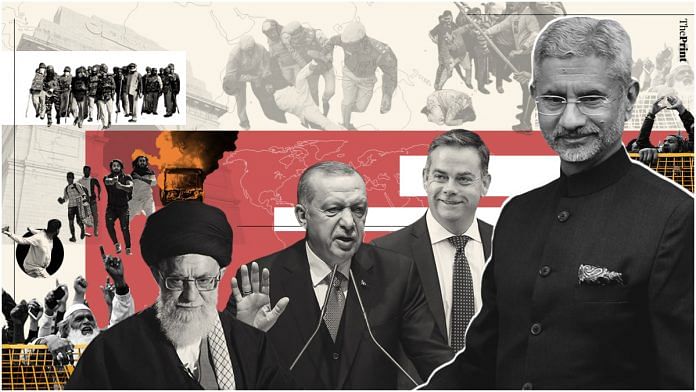When asked about India losing its allies over CAA, Kashmir and Delhi riots, external affairs minister S. Jaishankar said that “maybe we’re getting to know who our friends really are”. Last week, Iran’s supreme leader Ayatollah Ali Khamenei asked India to confront “extremist Hindus” and stop the “massacre” of Muslims. Turkish President Recep Tayyip Erdogan also criticised the Delhi riots. Protests broke out in Afghanistan, India’s long-time ally, over the riots as well.
ThePrint asks: S Jaishankar’s remark on India’s friends: Sign of new confidence or misplaced arrogance?
No arrogance in Jaishankar’s remark. Khamenei should focus on Iran’s internal problems
 Kanwal Sibal
Kanwal Sibal
Executive council member, VIF, and former foreign secretary
Jaishankar’s remark on Ali Khamenei’s highly offensive tweet can neither be characterised as a sign of new confidence nor misplaced arrogance. The opposite is true: the Iranian leader’s comment reflects misplaced arrogance and hollow self-confidence, given the reality of Iran’s situation today.
Khamenei threatens India with isolation from the Muslim world, but the Iranian leader’s statement is not representative of the views of the Muslim nations. Iran itself has been a cause of division since the 1979 revolution when it pitted the Shias against the Sunnis.
Khamenei needs to worry about Iran’s own international isolation in view of the draconian US sanctions imposed on it.
The security forces of the Iranian regime reportedly killed hundreds of street protesters in December 2019. India has not protested. Khamenei should attend to his own country’s internal problems instead of interfering in India’s.
His tweet’s hashtag “IndianMuslimsInDanger” is disgraceful.
Jaishankar’s reaction has been muted. His laconic remark on India’s friends has no arrogance in it. India has reacted in the past more strongly to affronts by even major powers. A low-key but subtle reaction to Khamenei’s gratuitous insult is not a reflection of any new found self-confidence.
To reject these international criticisms is a myopic view & unbecoming of great nation India is
 Talmiz Ahmad
Talmiz Ahmad
Former Indian Ambassador to Saudi Arabia, UAE & Oman
This is the case of extraordinary arrogance. It suggests that India is now cut off from the global value system relating to human rights, pluralism and accommodation of minorities. India has, in fact, upheld these principles for decades.
Several developing countries coping with the challenge of multiculturalism and economic development have viewed India as a model to be emulated. This is because India has accommodated extraordinary diversity in its democratic political order while simultaneously achieving considerable technological and economic success.
Sadly, today, there is a global perception that India is retreating from these principles. It seems to be shaping a new identity that is narrower, more aggressive and excludes, even demonises, various sections of its minorities — particularly the Muslims. This has evoked considerable criticism not just from some Muslim countries but also from a large number of other diverse sources globally. There is a sense of sorrow and deep anguish in the global media that India is systematically moving away from its own historic principles.
The best friend a nation can have is one which is able to criticise you frankly without you having to view that country as your enemy. This is true in our personal lives as well as in international relations. India’s critics are not enemy nations — these are nations with which we have extremely close ties. India’s relations with Iran and Turkey go back several centuries.
So, to reject these international criticisms and to suggest that these are coming from those who wish us ill, is a very short-sighted view and unbecoming of the great nation that India is.
Jaishankar sent a message to India’s detractors who feel it is their birthright to criticise everything we do
 Sushant Sareen
Sushant Sareen
Senior fellow, ORF
S. Jaishankar is far too seasoned a diplomat to either speak loosely or display arrogance. Unfortunately, in this era of soundbites, the text and context in which a statement is made is often pushed to the background, and confidence is mistaken for arrogance.
Foreign Minister Jaishankar was sending a diplomatic message to some of India’s detractors — Iran for one, but also some other countries and people who feel it is their birthright to interfere in India’s matters and criticise everything the country does.
It is rather rich of Iran, which is hardly the poster boy of progressive values, or a dictatorial leader like Turkish President Recep Tayyip Erdogan or even Malaysia, which hardly has a stellar record of treating its minorities, to comment on India.
Then there are the so-called (il)liberals in the West who are supercilious enough to think that the world must run as per their wishes. These people were never India’s friends, and if Jaishankar is calling them out, then that’s fine. But the rest of what he said is also important.
India is no longer a ship-to-mouth country, which goes with a begging bowl to the Europeans. It is no longer acceptable, much less palatable, for the Europeans to think they can hector India while having their own detention camps, deportation programmes and discriminatory immigration policies.
As Jaishankar said, India will engage with everyone who is willing to listen to our point of view, but won’t let ill-informed media alter policies that New Delhi makes to protect the country.
India is a powerful country and a sought-after partner. These are assets to be valued, not squandered on one-liners
 Rajesh Rajagopalan
Rajesh Rajagopalan
Professor of International Politics, JNU
Indian diplomacy has always been known for its prickliness. With each passing day, the Modi government is demonstrating that its foreign policy has greater continuity, especially in form, with its predecessors than it would like to accept.
Ticking off foreign governments, especially friendly ones, might get some applause from the Right-wing Hindu gallery, but it does little to convince others that India is growing into its responsibilities. India is now a much more powerful country and a sought-after partner. But these are assets to be valued and used pragmatically to advance Indian interests, not to be squandered on one-liners that do little of either.
India’s recent domestic behaviour is causing concern among India’s friends abroad: their concerns should be considered a warning sign and treated seriously precisely because they are friends and sympathisers. Imposing a litmus test on friends is an infantile approach to international politics.
Dismissiveness is not a signal of India’s power but rather an indicator that its traditional defensiveness continues and has found new reasons for such defensiveness. It is true that this is unlikely to have any significant negative effect given India’s utility in the regional Asian international order. But India shouldn’t seek to be valued because China is even worse, a dubious distinction that provides little room for celebration.
Also read: Yes Bank crisis: Has Modi govt done enough to fix financial sector woes to revive economy?
By Unnati Sharma, journalist at ThePrint




To a certain extent, it was naive arrogance. Bravery is feasible when you do not think about consequences and never been on the receiving end.
Indians expect more matured response from ex diplomats like Talmez. He is more concerned about Islamic interests than the security of India. Can a Hindu or a Christian become an ambassador in Turkey or Iran?Or at least they live with out in human persecution?
Well said
Knowing pretty well the facts and the back ground ,political compulsions made the yesterday’s diplomat to say so. My dear no secular country amends or make any law in terms of religion. Being a member of UN ,having signed various charters ,we are violating the provisions. We have to pay price if not today in future
No arrogance in Jaishankar’s remark. Khamenei should focus on Iran’s internal problems
Kanwal Sibal
To reject these international criticisms is a myopic view & unbecoming of great nation India is
Talmiz Ahmad
Jaishankar sent a message to India’s detractors who feel it is their birthright to criticise everything we do
Sushant Sareen
India is a powerful country and a sought-after partner. These are assets to be valued, not squandered on one-liners
Rajesh Rajagopalan
Does one need to comment?
Well said JaiShankar.
Let Mr Jaishankar enlighten us about his findings – – who really are india’s friends in today’s date.
Hindu haters always side with anti India forces. They feel happy to abuse and accuse Indian government on every possible occasion. This is because they have become irrelevant in Indian politics and now using India haters to defame India. A day may come when such people would commit suicide.
We should all be more worried about farmers committing suicide.
Having served as FS earlier, EAM is in a better position condense the wisdom, expertise and institutional memory of the diplomatic corps than a professional politician predecessor like S M Krishna. Now as member of the CCS, he carries greater authority and responsibility to articulate with candour and clarity the national interest. Not just to the rest of the world, as India’s Chief Diplomat, but also within the councils of government. That is clearly not happening. The Editor will have to update his earlier column of the train wreck Indian foreign policy has become.
Yes we should go back to becoming an international mouse where a failed neighbouring state could send people to kill hundreds of Indians with impunity without any consequence. That should make all our neighbours very happy.
Haha…Liberals have always taken India for a ride.
They set all these lofty principles for India to emulate but won’t ever question the credibility of our critics.
Who are we answerable to? An Islamist like Erdogan, who is undoing Kemal Ataturk’s Secular Turkey or an Islamic theocracy like Iran, which among other evil things, punishes women for not wearing a veil.
Jaishankar is absolutely correct, we don’t need such “friends” who want to tell us how to manage our internal affairs. We are better than them in managing ourselves. Maybe they can learn from us.